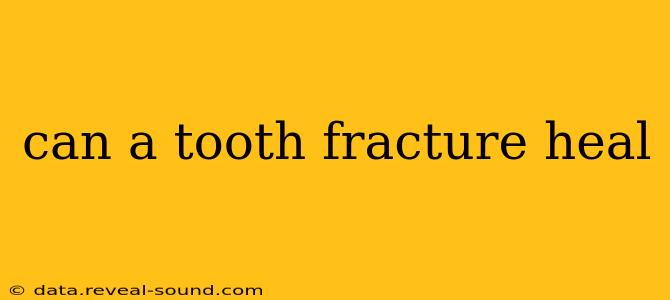A fractured tooth, unfortunately, doesn't heal like a broken bone. Teeth lack the same regenerative capabilities as bones. While the body can't repair a fractured tooth on its own, the extent of the damage and the type of fracture significantly impact the treatment options and the potential for restoring the tooth's function and appearance. Let's delve deeper into this critical topic.
What are the Different Types of Tooth Fractures?
Understanding the type of fracture is crucial in determining the treatment options and the potential for "healing." There are several classifications of tooth fractures:
- Fractured Enamel: This is the least severe type, involving only the outer layer of the tooth. Often, these minor chips require minimal or no treatment, though smoothing rough edges might be necessary.
- Fractured Enamel and Dentin: This involves damage to both the enamel and the underlying dentin (the softer layer beneath the enamel). Depending on the severity, this may require bonding or filling.
- Fractured Enamel, Dentin, and Pulp: This is a more serious fracture, reaching the pulp (the soft tissue containing nerves and blood vessels) inside the tooth. This type of fracture usually requires root canal treatment to prevent infection, followed by a crown to protect and restore the tooth.
- Vertical Root Fracture: This type of fracture extends from the crown (visible part) down the root and is often difficult to diagnose. Treatment options may include root canal therapy, extraction, or surgical repair, depending on the severity and location of the fracture.
- Completely Broken Tooth: In this case, a significant portion of the tooth is missing. Treatment depends on the extent of the damage and may involve extraction or the placement of a crown or implant.
Can a Cracked Tooth Heal on Its Own?
No, a cracked tooth cannot heal itself. The damage to the tooth structure is permanent. Leaving a cracked or fractured tooth untreated can lead to serious complications, including:
- Infection: Bacteria can easily enter the damaged tooth, leading to infection of the pulp and surrounding tissues.
- Abscess: A painful, pus-filled abscess can develop at the root of the tooth.
- Tooth Loss: Untreated fractures can eventually result in the loss of the tooth.
How are Tooth Fractures Treated?
Treatment for a tooth fracture varies widely depending on the type and severity of the fracture. Common treatment options include:
- Dental Bonding: This cosmetic procedure uses a composite resin to repair small chips and cracks in the enamel.
- Dental Fillings: Fillings are used to repair larger fractures that extend into the dentin.
- Crowns: A crown covers the entire tooth to restore its shape, strength, and protection.
- Root Canal Therapy: This procedure removes the infected pulp, cleans the root canals, and seals them to prevent further infection.
- Extraction: In cases of severe fractures, extraction might be necessary.
- Dental Implants: Dental implants are artificial tooth roots that can replace missing teeth.
What Should I Do if I Suspect a Tooth Fracture?
If you suspect you have a fractured tooth, it's essential to see a dentist immediately. Prompt treatment is crucial to prevent complications and preserve your tooth. Early diagnosis and intervention can often save the tooth and prevent the need for more extensive procedures.
Does a fractured tooth always need a root canal?
Not always. A root canal is only necessary if the fracture extends into the pulp (the inner part of the tooth containing nerves and blood vessels). If the fracture is limited to the enamel and dentin, a filling or bonding might suffice.
How long does it take for a fractured tooth to heal? (Or, more accurately, how long does treatment take?)
The healing time, or more accurately, the time it takes for treatment to be completed, varies depending on the type of fracture and the necessary procedure. A simple bonding might take one appointment, while a root canal and crown can take several weeks.
Can a cracked tooth be saved?
Yes, a cracked tooth can often be saved with proper treatment. The success rate depends heavily on the severity of the crack and how quickly it is addressed by a dental professional. Early diagnosis and prompt treatment are key.
This information is for general knowledge and does not constitute medical advice. Always consult a dentist for diagnosis and treatment of any dental concerns.
